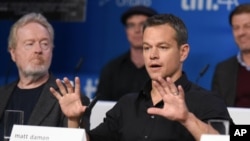A boom in high-quality television should be welcomed rather than feared, said actors and filmmakers attending this year's Toronto's International
Film Festival, which for the first time included a program dedicated to TV shows.
Organizers of the 10-day event, a key launching pad for Hollywood's award season, said the inclusion of TV shows reflected the "growing convergence and artistic equality between television and cinema."
But the ascent of television is also partly the result of Hollywood studios favoring big-budget franchise films, often based on comic books, that appeal to a wide audience, industry veterans said.
From two to 20 hours
Many writers and directors who are keen to produce more complex and challenging stories are looking elsewhere, said Matt Damon, who won an Oscar for co-writing "Good Will Hunting."
"A lot of us spent our adult lives thinking about two hours and three acts. [We're] now migrating to television going, 'OK, how do I tell this story over 20 hours?'" he told Reuters.
"The movie that was my bread and butter for years, the $25 million to $50 million character drama, is just gone. They just don't make that anymore."
The six programs in the September 10-20 festival's "Primetime" section include U.S. family comedy "Casual," Icelandic crime drama "Trapped" and French supernatural thriller "The Returned."
Some critics say the so-called second golden age of television, which has produced the likes of "Breaking Bad" and "Mad Men," has supplanted movies as the more sophisticated and influential medium.
But actors, directors and screenwriters attending the festival said the issue shouldn't be seen this way.
"I don't think it's a threat at all," said "12 Years a Slave" star Chiwetel Ejiofor. "We've all enjoyed [these shows] becoming as brilliant as they have."
Breeding ground for new writers
"Gladiator" director Ridley Scott, who got his start doing BBC programs in the 1960s, said that with many big movies being "fundamentally brainless," television was proving to be a great breeding ground for new writers.
For a long time, the film industry has undervalued what writers do, and the rise of television has helped rectify this, said "Meet the Parents" director Jay Roach.
"It's good for all of us if there are no monopolies either way," he said.
Indeed, some stories are best told over long arcs, said "Breaking Bad" star Bryan Cranston, at the festival with the biopic "Trumbo."
"A story should dictate the medium, not the other way around," he said. "'Breaking Bad' for instance, would have made a terrible movie."
Television now is similar to what it was in Britain in the 1970s, when the struggles of the U.K. film industry sent many performers to the small screen, said Oscar-winner Helen Mirren, a luminary of both mediums.
"The two have always been in a symbiotic relationship," she said. "I always used to say film is alive and well and living on television in England at that time. And I think that's still the case."





